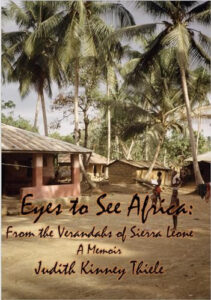Judith Kinney Thiele (Sierra Leone) writes EYES TO SEE AFRICA
Eyes to See Africa: From the Verandahs of Sierra Leone
by Judith Kinney Thiele (Sierra Leone 1985-87)
Self Published
February 2024
471 pages
$4.99 (Kindle); $23.00 (Paperback)
Kinney’s dark room echoes a monk’s spare cell. Mosquito net. Metal cot. Two suitcases. A two-year vow of near-poverty. Outside on the road, chickens chase giant bugs. Goats weave through the foot-traffic as people balance baskets, bundles, and buckets on their heads.
It will get better. She’ll figure it out.
Taking a break from her Silicon Valley desk job gives service to a needy world and brings her middle-aged self back to basics. A new community center seeks her health and rural development skills, introducing her to the people of the chiefdom. She meets kindness and acceptance amid the complicated “how-do” of days lived without electricity or clean water.
Unfamiliar noises, food, and taboos shape her new life. From landing to takeoff, Kinney’s adventure never subsides. The story demands to be shared.
Rumblings of the coming 11-year civil war intensify over Kinney’s 26-month stay. The culture, infrastructure — everything she encounters — will be transformed. Her adventure becomes history, an archive of pre-war community structure and life.
Bridging two worlds, Kinney Thiele finds that the verandahs of Sierra Leone offer neutral ground for direct exchange. A greeting to passers-by, a short visit, or a long conversation offer warm chances to widen the two-way perspectives of all involved.
Kinney writes…

I hope that you will read my book and ride on my shoulders through some of the best and worst days of my life. It was inspired from living and working as a Peace Corps Volunteer in Sierra Leone prior to the eleven-year war that shattered life across the land.
My assignment was a perfect match, and my spirit sang with every trek to bush villages; each evening’s talk with neighbors; and the lessons for how to live under circumstances common to my ancestors before they had running water and electricity. This is not a tourist’s glimpse, nor an academic’s detailed report, though it has turned out to be an accidental history. It’s sometimes playful, profound, perfunctory, or pathetic. Thanks to the determination of the local people, much of what we dreamed and worked together to make happen has been carried forward and put into action for better health and education in the chiefdom.
The book is on Amazon and Kindle. There are three editions: a deluxe paperback in full color; the same, but more economically priced, in black and white; and a full-color electronic edition that is free to some subscribers or about $5 for others.

gluconite for blood sugar.